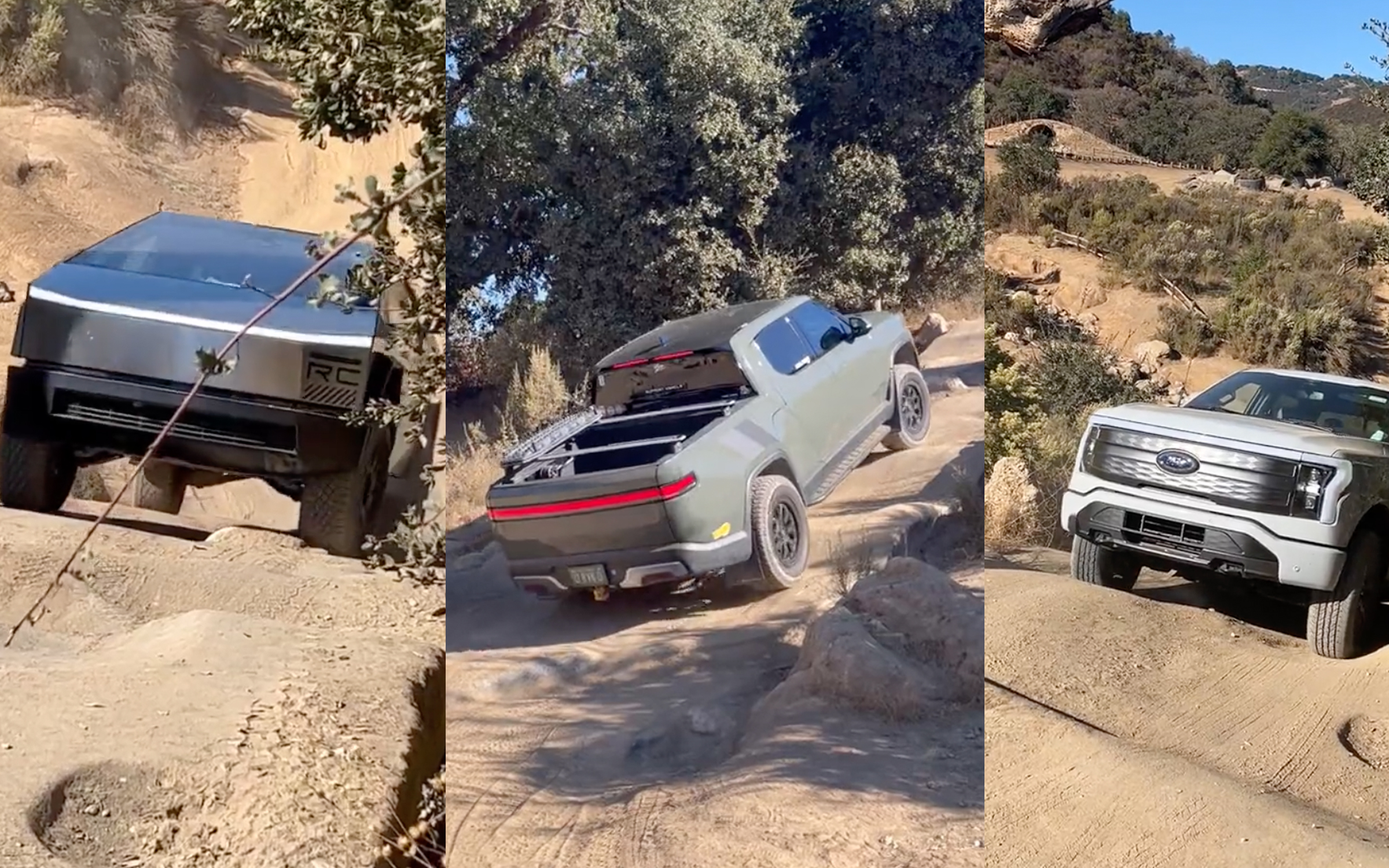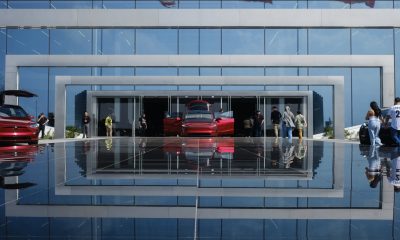

News
Cybertruck, R1T and F-150 Lightning Hollister Hills stairs runs compared
Clips of a Tesla Cybertruck climbing the stair steps at the Hollister Hills State Vehicular Recreation Area (SVRA) have circulated widely this week, especially after a Rivian R1T owner followed up with a video of their electric pickup performing the same obstacle. Now, Ford CEO Jim Farley has also chimed in, showing off footage of the same California stair steps driven by the Ford F-150 Lightning.
Multiple of Tesla’s Cybertrucks were seen during a round of testing at the SVRA site ahead of its initial deliveries later this month, as were originally spotted a few weeks ago, and shared in a post on Instagram. The R1T and F-150 Lightning attempts at the steps have since been shared on X, along with additional angles of the Cybertruck release candidate performing the obstacle.
Some have criticized the Cybertruck’s performance since the video’s release, as the R1T run seems to handle the stairs a little bit more quickly, at the very least. The F-150 Lightning also performs the stair step with some level of ease, though it’s not quite as clean of a run as the R1T footage seems to accomplish. Others have also said that a different driver could change each of these runs completely, and that an experienced off-road driver would have handled the Cybertruck’s run differently.
Tesla Cybertruck sighting next to Rivian R1T shows size comparison
It’s also worth noting that Tesla’s Cybertrucks were pre-production vehicles testing, as the trucks haven’t yet been delivered to customers at this time — and they clearly show “release candidate” decals to signify this.
User omg_Tesla, who posted the R1T footage on X, also points out that the stair step obstacle is primarily made from cement, created to offer a particularly low-traction surface to force vehicles to flex and articulate their suspension levels. The more vehicles that drive up, the user says, the more trails of dirt are left behind, making the path more slippery. A few other vehicles can also be seen driving around on the steps in the original Cybertruck footage, presumably making them more difficult during Tesla’s tests.
In any case, it’s hard to deny that all three of these pickups manage the obstacle relatively well, especially given that they’re early fully electric models in an emerging sector.
You can watch the Tesla Cybertruck, the Rivian R1T and the Ford F-150 Lightning drive on the Hollister Hills SVRA stairs below, and you can tell us your conclusions down in the comments section.
Tesla Cybertruck performing the Hollister Hills SVRA stair step
Here's another angle of the Hollister Hills climb. People thought it was a dirt hill and Cybertruck did poorly. In reality it's a lot more difficult and Cybertruck did well. pic.twitter.com/xlOIHA3pzN
— Dirty Tesla (@DirtyTesLa) November 12, 2023
Rivian R1T performing the Hollister Hills SVRA stair step
Cake walk! Tried to copy what the Cybertruck did https://t.co/t9gkJKfBXw pic.twitter.com/pBDnFw7kcw
— OMG_TESLA/RIVIAN (@omg_tesla) November 12, 2023
Ford F-150 Lightning performing the Hollister Hills SVRA stair step
F-150 Lightning does it all. 👍 pic.twitter.com/uCMUSxUIpj
— Jim Farley (@jimfarley98) November 15, 2023
What are your thoughts? Let me know at zach@teslarati.com, find me on X at @zacharyvisconti, or send your tips to us at tips@teslarati.com.
News
Tesla sales soar in Norway with new Model Y leading the charge
Tesla recorded a 54% year-over-year jump in new vehicle registrations in June.

Tesla is seeing strong momentum in Norway, with sales of the new Model Y helping the company maintain dominance in one of the world’s most electric vehicle-friendly markets.
Model Y upgrades and consumer preferences
According to the Norwegian Road Federation (OFV), Tesla recorded a 54% year-over-year jump in new vehicle registrations in June. The Model Y led the charge, posting a 115% increase compared to the same period last year. Tesla Norway’s growth was even more notable in May, with sales surging a whopping 213%, as noted in a CNBC report.
Christina Bu, secretary general of the Norwegian EV Association (NEVA), stated that Tesla’s strong market performance was partly due to the updated Model Y, which is really just a good car, period.
“I think it just has to do with the fact that they deliver a car which has quite a lot of value for money and is what Norwegians need. What Norwegians need, a large luggage space, all wheel drive, and a tow hitch, high ground clearance as well. In addition, quite good digital solutions which people have gotten used to, and also a charging network,” she said.
Tesla in Europe
Tesla’s success in Norway is supported by long-standing government incentives for EV adoption, including exemptions from VAT, road toll discounts, and access to bus lanes. Public and home charging infrastructure is also widely available, making the EV ownership experience in the country very convenient.
Tesla’s performance in Europe is still a mixed bag, with markets like Germany and France still seeing declines in recent months. In areas such as Norway, Spain, and Portugal, however, Tesla’s new car registrations are rising. Spain’s sales rose 61% and Portugal’s sales rose 7% last month. This suggests that regional demand may be stabilizing or rebounding in pockets of Europe.
News
Tesla to open first India experience center in Mumbai on July 15
The event is scheduled for July 15 at the Bandra Kurla Complex, a premier business district in Mumbai.

Tesla is officially entering India with the opening of its first showroom and experience center in Mumbai next week. The event is scheduled for July 15 at the Bandra Kurla Complex, a premier business district in Mumbai.
Tesla imports to India signal an early-stage market entry strategy
According to Indian customs data, Tesla has imported approximately $1 million worth of vehicles, charging equipment, and merchandise into the country between January and June. The shipments include six Model Y comprised of five standard variants valued at $32,500 each and one long-range model valued at $46,000. Several Superchargers and related accessories were also imported into the country, as noted in a Yahoo Finance report.
These vehicles are expected to serve as display models and test units as Tesla gauges interest and navigates India’s high import duties, which hover around 70% on fully built vehicles. Despite the significant tariffs in the country, Tesla has opted to begin its India expansion with imported cars.
An invitation to the Tesla India launch event has been making the rounds online. As could be seen in the document, Tesla noted that July 15 would be the launch of Tesla in India through the opening of a Tesla experience centre at Bandra Kurla Complex in Mumbai.
Tesla India’s hiring and expansion efforts are underway
Tesla has filled a number of key roles from the 30+ positions it advertised earlier this year. Recent hires include store managers, service executives, and sales staff, while ongoing recruitment is focused on supply chain engineers and vehicle operators to support the company’s Autopilot program.
Indian officials have been open about their intention to encourage Tesla to establish a manufacturing hub in the country. Tesla does seem open to the idea, at least, with reports last year hinting that Elon Musk was set to visit the country to discuss or even potentially announce a domestic project. The trip, however, was ultimately canceled.
News
Tesla begins Robotaxi certification push in Arizona: report
Tesla seems serious about expanding its Robotaxi service to several states in the coming months.

Tesla has initiated discussions with Arizona transportation regulators to certify its driverless Robotaxi service in the state, as per a recent report from Bloomberg News. The move follows Tesla’s launch of its Robotaxi pilot program in Austin, Texas, as well as CEO Elon Musk’s recent comments about the service’s expansion in the Bay Area.
The Arizona Department of Transportation confirmed to Bloomberg that Tesla has reached out to begin the certification process for autonomous ride-sharing operations in the state. While details remain limited, the outreach suggests that Tesla is serious about expanding its driverless Robotaxi service to several territories in the coming months.
The Arizona development comes as Tesla prepares to expand its service area in Austin this weekend, as per CEO Elon Musk in a post on X. Musk also stated that Tesla is targeting the San Francisco Bay Area as its next major market, with a potential launch “in a month or two,” pending regulatory approvals.
Tesla first launched its autonomous ride-hailing program on June 22 in Austin with a small fleet of Model Y vehicles, accompanied by a Tesla employee in the passenger seat to monitor safety. While still classified as a test, Musk has said the program will expand to about 1,000 vehicles in the coming months. Tesla will later upgrade its Robotaxi fleet with the Cyercab, a two-seater that is designed without a steering wheel.
Sightings of Cybercab castings around the Giga Texas complex suggests that Tesla may be ramping the initial trial production of the self-driving two-seater. Tesla, for its part, has noted in the past that volume production of the Cybercab is expected to start sometime next year.
In California, Tesla has already applied for a transportation charter-party carrier permit from the state’s Public Utilities Commission. The company is reportedly taking a phased approach to operating in California, with the Robotaxi service starting with pre-arranged rides for employees in vehicles with safety drivers.
-

 Elon Musk2 weeks ago
Elon Musk2 weeks agoTesla investors will be shocked by Jim Cramer’s latest assessment
-

 Elon Musk1 day ago
Elon Musk1 day agoxAI launches Grok 4 with new $300/month SuperGrok Heavy subscription
-

 Elon Musk3 days ago
Elon Musk3 days agoElon Musk confirms Grok 4 launch on July 9 with livestream event
-

 News1 week ago
News1 week agoTesla Model 3 ranks as the safest new car in Europe for 2025, per Euro NCAP tests
-

 Elon Musk2 weeks ago
Elon Musk2 weeks agoA Tesla just delivered itself to a customer autonomously, Elon Musk confirms
-

 Elon Musk1 week ago
Elon Musk1 week agoxAI’s Memphis data center receives air permit despite community criticism
-

 News2 weeks ago
News2 weeks agoXiaomi CEO congratulates Tesla on first FSD delivery: “We have to continue learning!”
-

 Elon Musk2 weeks ago
Elon Musk2 weeks agoTesla still has two major milestones on track before end of Q2
















